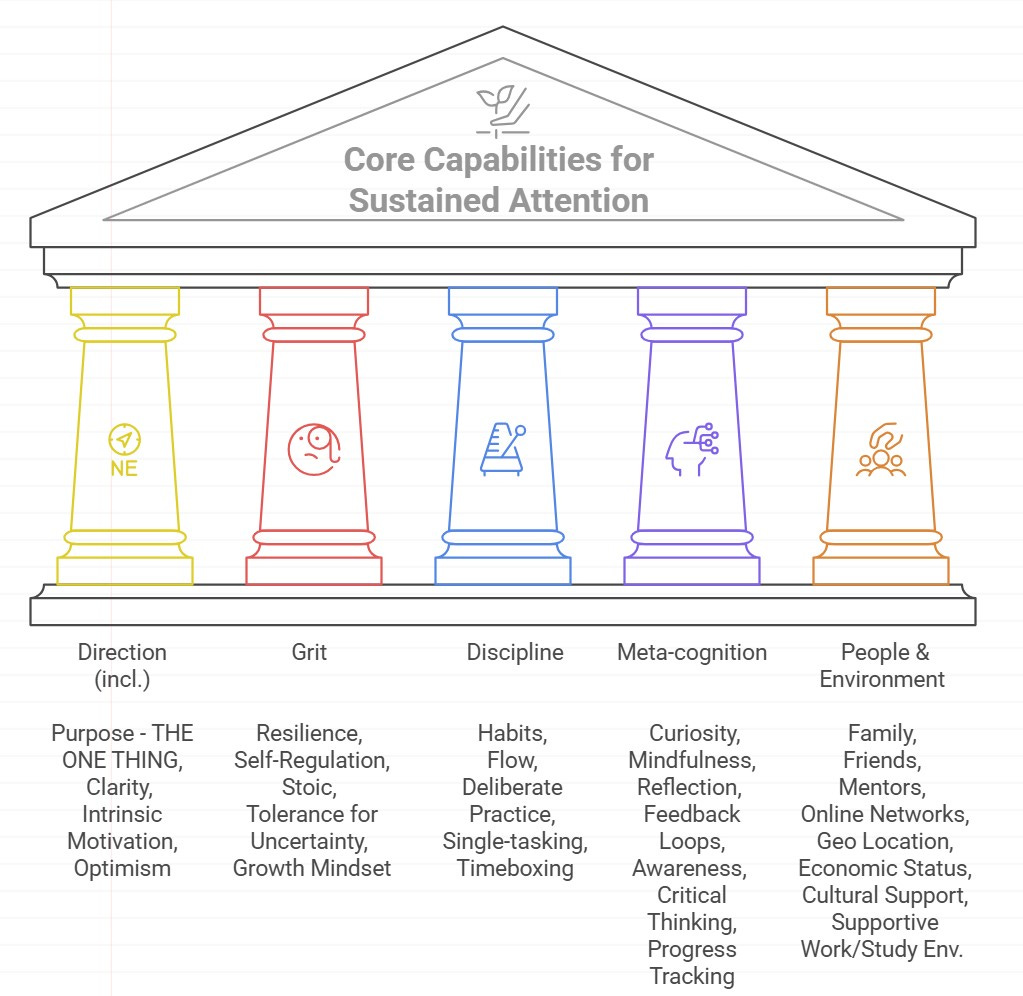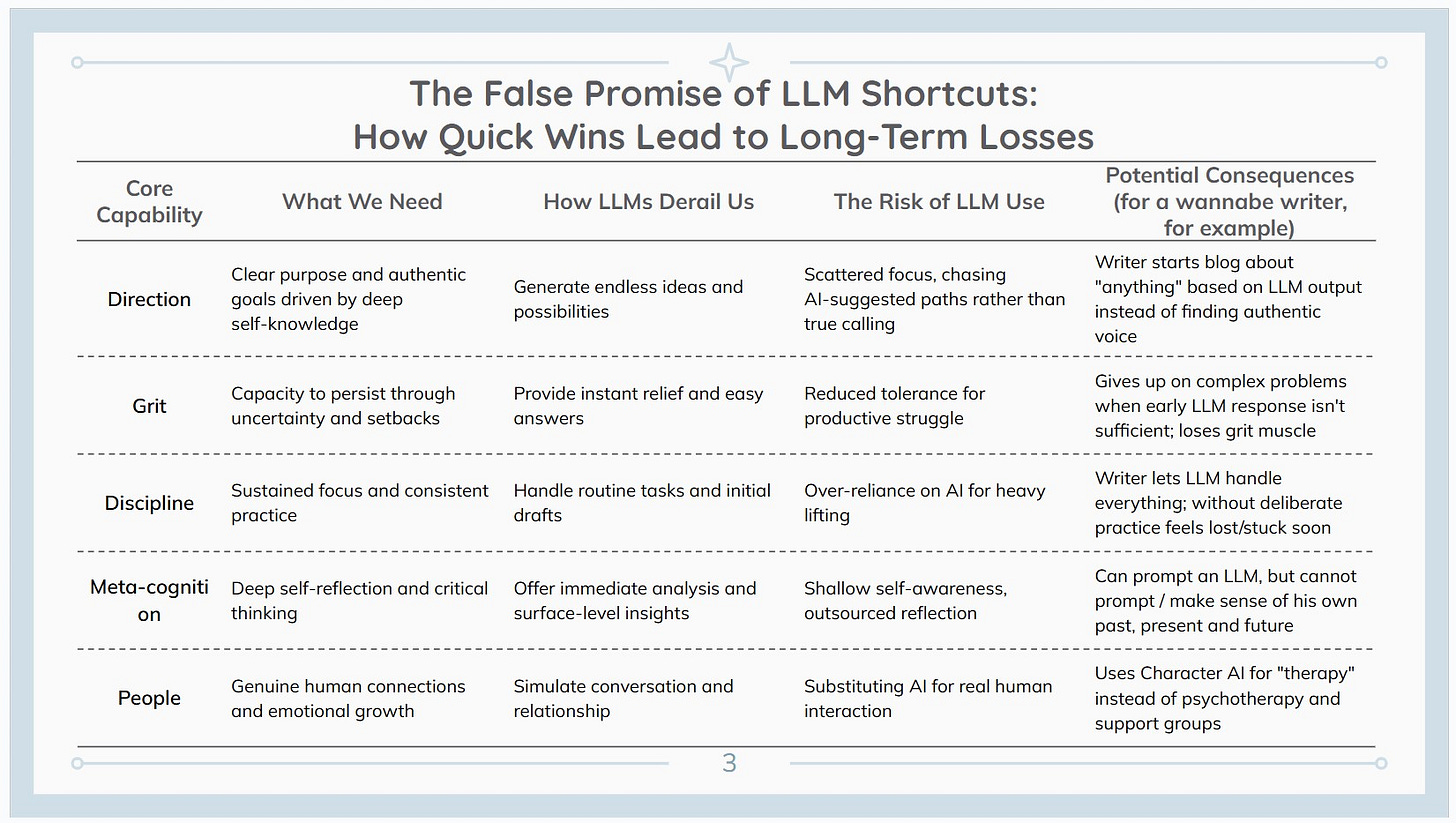The LLM Paradox: The More We Use LLMs, The Less We Can Use Them Well - Part 2
Use It AND Lose It: Why Traditional Wisdom Fails in the AI Age
In my previous essay (Part 1 of my Long Game Series), I introduced the concept of the "perseverance economy"—where sustained attention on complex problems becomes our most valuable resource in the age of LLMs. Here is a quick preview:
Now, I want to address a troubling paradox:
The more mindlessly we use AI tools, the less capable we become of using them effectively.
This creates a situation similar to muscle atrophy: just as dependence on crutches weakens our ability to walk independently, excessive reliance on LLMs may diminish our capacity to:
Formulate worthy questions
Sustain attention and curiosity towards complex problems
Build meaningful human connections
Think critically and independently
As Annie Dillard reminds us, "How we spend our days is how we spend our lives." If we spend our days seeking instant solutions from LLMs, we lose the ability to work on problems that require years of dedication.“
Further widening the divide, those who could benefit most from AI often lack the foundation to use it effectively, while those who need it least can leverage it most powerfully.
The alternative path requires wisdom: learning to think both with and without AI, and developing the discernment to know when each approach serves us better.
This brings us to a new serenity prayer for the AI age:
Grant me the serenity to accept that LLMs won't raise my EQ, the courage to partner with them on problems of IQ, and the wisdom to know when life calls for one over the other.
The Urgency: Unlike previous technological shifts like smartphones or social media, we don't have a decade to adapt to LLMs. By the time we fully understand their effects, our capacity for the deep work needed to direct them wisely will have already atrophied.
The rest of this essay highlights how LLMs affect our capability to thrive and how we can make them allies instead of detracting us from our goals.
What it takes to sustain attention on long-term problems (aka thrive in the perseverance economy):
Let me be honest. While i have read and thought a lot about what it will take to pay sustained attention to problems for the long haul (5-10 years or more), I did feel ChatGPT’s “Deep Research” output to this question was more comprehensive than I could have expected what my manual effort could have produced. So here is a summary of what ChatGPT summarized as the 5 core dimensions that are essential for sustained attention (with some tweaks based on my personal experience):
How Mindless LLMs erode our capability to do well across all the core dimensions that are essential for thriving in the perseverance economy:
Why I will always love humans more than Claude 3.5 Sonnet and ChatGPT’s Deep Research?
Direction: Alain de Botton spent years exploring philosophy, therapy, and art before founding The School of Life. No LLM could have revealed this path—it emerged from personal struggle and authentic curiosity about human nature.
Grit: Ted Gioia wrote for decades without recognition, building deep expertise in both music and business. While LLMs offer instant content, they can't replicate his 30+ years of persistent investigation across disciplines.
Discipline: Morgan Housel wrote over 3,000 articles before "Psychology of Money." No LLM could have developed his distinct voice—it came from consistent practice and learning from reader feedback over years.
Meta-cognition: Sam Harris's insights on consciousness emerged from 30+ years of meditation and scientific study. LLMs might summarize his work, but can't replace the deep personal investigation required for such understanding.
People: David Perell built Write of Passage through thousands of real conversations with writers. While LLMs can simulate interaction, they can't build the authentic community that drives creative growth.
How I'm Navigating These Challenges:
1. Direction: When I started my blog in Dec 2022, I named it "Curious Stoic" because I honestly had no idea what I wanted to write about. I just knew I needed a vehicle for self-expression and Curiosity and Stoicism were the traits that i identified the most back then - hence the name. I wrote about what I knew then—optimizing for a good life. Everything changed in August 2023 when I was diagnosed with ADHD at age 33. This revelation sparked an intense interest in understanding attention, leading me to dive deep into the attention economy, especially in light of LLMs. While I still get distracted, this direction emerged from personal introspection and life experience—the kind of authentic insight no LLM could generate.
2. Grit: My ADHD gives me a high curiosity trait that makes me jump from topic to topic, podcast to podcast. But the more I learn about attention and ADHD, the stronger my conviction grows to play the long game. Research shows it takes about 40 hours of interaction to form a meaningful friendship. This insight helped me realize that developing grit in any area requires a similar commitment to sustained engagement. I've noticed this in my own reading habits—I find greater satisfaction diving deeper into authors I already know well, like Alain de Botton and Morgan Housel, rather than constantly chasing new voices. The more time I invest in understanding attention, the more committed I become to this journey.
3. Discipline: LLMs have surprisingly become allies in my quest for discipline. My primary goal this year is to publish one article monthly on my Substack—something my perfectionist tendencies might have prevented without LLM assistance. While these tools can send me spiraling in a million directions, I'm learning to harness them effectively. The key is clarity: when I have specific objectives (like publishing before month's end with a solid outline), LLMs help rather than hinder. Without such clear goals, they become just another source of distraction.
4. People (Support): I've discovered that LLMs' ability to handle cognitive heavy lifting creates space for what truly matters—deepening family relationships, engaging in writing communities, and participating in cohort-based courses. However, I'm acutely aware of the risks. Many people are turning to LLMs as substitutes for human connection, using tools like Character AI for companionship or ChatGPT for therapy. But as polyvagal theory pioneer Stephen Porges emphasizes, face-to-face interactions remain essential for soothing our nervous systems. This balance between leveraging AI's efficiency and preserving genuine human connection requires constant mindfulness.
5. Meta-cognition: My journey of self-awareness has been shaped by multiple streams of experience, each contributing uniquely to my growth. Writing has been fundamental—from my first article advocating becoming a "feedback-attracting machine" to exploring how modern technology impacts contemplation (inspired by Nicholas Carr's "The Shallows"). I've developed more conviction about the growth equation (proposed by Brad Stulberg and Steve Magness) that "Stress + Rest = Growth." The deepest insights have come from actual human experiences: two years of therapy, daily 10 mins meditation through the Waking Up app (a Tim Ferriss recommendation I've followed since 2019), and my ADHD diagnosis. These experiences forced me to confront childhood memories, particularly my struggles with play and growing up with a strict, hard-to-please father. The School of Life's resources (created by Alain de Botton) have further deepened this self-reflection—the kind of personal growth that demands human struggle and can't be shortcut by AI.
What’s Coming?
This essay revealed the subtle complexities of repetitive LLM usage and how these tools can erode our most crucial skills for thriving in the new economy. Our choice is clear—we must consciously harness LLMs to support our growth and objectives, and it is so easy to get derailed.
In the next essay, I'll share practical strategies and habits that have helped me use LLMs mindfully. Meanwhile, I'm curious: How are you navigating this balance? Have you found specific ways to use LLMs that enhance rather than replace your thinking? Share your experiences in the comments—whether it's a success story or a cautionary tale, your insight could help others find their path through these exciting times.
If this exploration of attention, AI, and human potential resonates with you, I'd love to continue the conversation. Subscribe to my newsletter "Attending to Attention" (on Substack) where I’m building a community of thoughtful humans working to stay focused and authentic in the age of AI. Together, we can learn to use these powerful tools while preserving what makes us uniquely human.
Join us we navigate this fascinating intersection of technology and human consciousness. I would love to hear your perspectives, and I believe our collective wisdom will help shape a more mindful future.







Yes, I remember that I naturally figured this out while using AI. Thus, within a week, I reduced the usage for AI for exercises such as analysis, thinking and evaluation. I started to be mindful and question the situation & text without AI by my multiple ways to think. LLM can hamper our critical thinking agreed. The place to best use them imo is for knowledge database and collection purposes. This might enable us to know things which we may be unaware of.
I find it darkly fascinating that the crux of this essay, which is how LLMs derail our thinking or make us lazy thinkers, was put together with the help of an LLM! I look forward to reading your Part 2 on how you deal with this internal inconsistency.